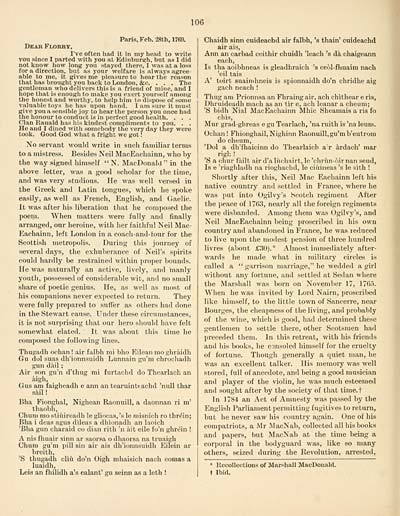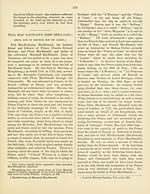Download files
Complete book:
Individual page:
Thumbnail gallery: Grid view | List view

Paris.Feb. 28th, 1769.
Dear Flokry,
I've often had it in my head to write
you since I parted with you at Edinburgh, but as I did
not know liow long you stayed there, I was at a loss
for a direction, but as your welfare is always agree-
able to me, it gives me pleasure to hear the reason
that has brought you back to London, &c. . . . The
the honest and worthy, to help him to dispose of s
valuable toys he has upon hand. I am sure it must
give you a sensible joy to hear the person you once had
the honour to conduct is in perfect good health. . . .
Clan Ranald has his kindest compliments to you. . .
He and I dined with somebody the very day they were
took. Good God what a fright we got !
No servant would write in sucli familiar terms
to a mistress. Besides Neil MacEachainn, who by
the way signed himself "N. MacDonaid " in the
above letter, was a good scholar for the time,
and was very studious. He was well versed in
the Greek and Latin tongues, which he spoke
easily, as well as French, English, and Gaelic.
It was after his liberation that he composed the
poem. When matters were fully and finally
arranged, our heroine, with her faithful Neil Mac-
Eachainn, left London in a coach-and-tour for the
Scottish metropolis. During this jonrney of
several days, the exhuberance of Neil's spirits
could hardly be restrained within proper bounds.
He was naturally an active, lively, and manly
youth, possessed of considerable wit, and no small
share of poetic genius. He, as well as most of
his companions never expected to return. They
were fully prepared to suffer as others had done
in the Stewart cause. Under these circumstances,
it is not surprising that our hero should have felt
somewhat elated. It was about this time he
composed the following lines.
Thugadh ochan ! air falbh mi bho Eilean mo ghràidh
Gu dol suas dh'ionnsuidh Lunnain gu'm chrochadh
gun dàil ;
Air son gu'n d'thug mi furtachd do Thearlach an
àigh,
Gus am faigheadh e ann an tearuinteachd 'null thar
sail !
Bha Fionghal, Nighean Raonuill, a daonnan ri m'
thaobh.
Chum mostiùireadhlegliocas,'sle misnich rothrèin;
Bha i deas agus dileas a dhionadh an laoich
'Bha gun charaid co dian rith 'n ait eile fo'n ghrein !
A nis fhuair sinn ar saorsa o dhaorsa na truaigh
Chum gu'm pill sin air ais dh'ionnsuidh Eilein ar
breith,
'S thugadh clìù do'n Oigh mhaisich nach comas a
luaidh,
Leis an fhilidh a's ealant' gu seinn as a leth !
Chaidh sinn cuideachd air falbh, 's thain' cuideachd
air ais,
Ann an carbad ceithir chuidh 'leach 's da chaigeann
each.
Is tha aoibhneas is gleadhraich 's ceòl-fhuaim nach
'eil tais
A' toirt suaimhneis is spionnaidh do'n chridhe aig
gach neach !
Thug am Prionnsa an Fhraing air, ach chithear e ris,
Dhruideadh mach as an tir e, ach leanar a cheum;
'S bidh Nial MacEachainn Mhic Sheamais a ris fo
chis,
Mur grad-ghreas e gu Tearlach, 'na ruith is 'na leum.
Ochan ! Fhionghail, Nighinn Raonuill, gu'm b'eutrom
do cheum,
'Dol a dh'fhaicinn do Thearlaich a'r àrdach' mar
righ !
'S a chur fàilt air d'alùchairt, le 'chrìm-òir nan seud,
Is e 'riaghladh na rioghachd, le ciùineas 's le sith !
Shortly after this, Neil Mac Eachainn left his
native country and settled in France, where he
was put into Ogilvy's Scotch regiment After
the peace of 1763, nearly all the foreign regiments
were disbanded. Among them was Ogilvy's, and
Neil MacEachainn being proscribed in his own
country and abandoned in France, he was reduced
to live ujion the modest pension of three hundred
livres (about £30).* Almost immediately after-
wards he made what in military circles is
called a "garrison marriage," he wedded a girl
without any fortune, and settled at Sedan where
the Marshall was born on Noveml>er 17, 1765.
"When he was invited by Lord Nairn, proscribed
like himself, to the little town of Sancerre, near
Bourges, the cheapness of the living, and probably
of the wine, which is good, had determined these
gentlemen to settle there, other Scotsmen had
preceded them. In this retreat, with his friends
and his books, he consoled himself for the cruelty
of fortune. Though generally a quiet man, he
was an excellent talker. His memory was well
stored, full of anecdote, and being a good musician
and player of the violin, he was much esteemed
and sought after by the society of that time.f
In 1784 an Act of Amnesty was passed by the
English Parliament permitting fugitives to return,
but he never saw his country again. One of his
compatriots, a Mr MacNab, collected all his books
and papers, but MacNab at the time being a
corporal in the bodyguard was, like so many
others, seized during the Revolution, arrested.
Dear Flokry,
I've often had it in my head to write
you since I parted with you at Edinburgh, but as I did
not know liow long you stayed there, I was at a loss
for a direction, but as your welfare is always agree-
able to me, it gives me pleasure to hear the reason
that has brought you back to London, &c. . . . The
the honest and worthy, to help him to dispose of s
valuable toys he has upon hand. I am sure it must
give you a sensible joy to hear the person you once had
the honour to conduct is in perfect good health. . . .
Clan Ranald has his kindest compliments to you. . .
He and I dined with somebody the very day they were
took. Good God what a fright we got !
No servant would write in sucli familiar terms
to a mistress. Besides Neil MacEachainn, who by
the way signed himself "N. MacDonaid " in the
above letter, was a good scholar for the time,
and was very studious. He was well versed in
the Greek and Latin tongues, which he spoke
easily, as well as French, English, and Gaelic.
It was after his liberation that he composed the
poem. When matters were fully and finally
arranged, our heroine, with her faithful Neil Mac-
Eachainn, left London in a coach-and-tour for the
Scottish metropolis. During this jonrney of
several days, the exhuberance of Neil's spirits
could hardly be restrained within proper bounds.
He was naturally an active, lively, and manly
youth, possessed of considerable wit, and no small
share of poetic genius. He, as well as most of
his companions never expected to return. They
were fully prepared to suffer as others had done
in the Stewart cause. Under these circumstances,
it is not surprising that our hero should have felt
somewhat elated. It was about this time he
composed the following lines.
Thugadh ochan ! air falbh mi bho Eilean mo ghràidh
Gu dol suas dh'ionnsuidh Lunnain gu'm chrochadh
gun dàil ;
Air son gu'n d'thug mi furtachd do Thearlach an
àigh,
Gus am faigheadh e ann an tearuinteachd 'null thar
sail !
Bha Fionghal, Nighean Raonuill, a daonnan ri m'
thaobh.
Chum mostiùireadhlegliocas,'sle misnich rothrèin;
Bha i deas agus dileas a dhionadh an laoich
'Bha gun charaid co dian rith 'n ait eile fo'n ghrein !
A nis fhuair sinn ar saorsa o dhaorsa na truaigh
Chum gu'm pill sin air ais dh'ionnsuidh Eilein ar
breith,
'S thugadh clìù do'n Oigh mhaisich nach comas a
luaidh,
Leis an fhilidh a's ealant' gu seinn as a leth !
Chaidh sinn cuideachd air falbh, 's thain' cuideachd
air ais,
Ann an carbad ceithir chuidh 'leach 's da chaigeann
each.
Is tha aoibhneas is gleadhraich 's ceòl-fhuaim nach
'eil tais
A' toirt suaimhneis is spionnaidh do'n chridhe aig
gach neach !
Thug am Prionnsa an Fhraing air, ach chithear e ris,
Dhruideadh mach as an tir e, ach leanar a cheum;
'S bidh Nial MacEachainn Mhic Sheamais a ris fo
chis,
Mur grad-ghreas e gu Tearlach, 'na ruith is 'na leum.
Ochan ! Fhionghail, Nighinn Raonuill, gu'm b'eutrom
do cheum,
'Dol a dh'fhaicinn do Thearlaich a'r àrdach' mar
righ !
'S a chur fàilt air d'alùchairt, le 'chrìm-òir nan seud,
Is e 'riaghladh na rioghachd, le ciùineas 's le sith !
Shortly after this, Neil Mac Eachainn left his
native country and settled in France, where he
was put into Ogilvy's Scotch regiment After
the peace of 1763, nearly all the foreign regiments
were disbanded. Among them was Ogilvy's, and
Neil MacEachainn being proscribed in his own
country and abandoned in France, he was reduced
to live ujion the modest pension of three hundred
livres (about £30).* Almost immediately after-
wards he made what in military circles is
called a "garrison marriage," he wedded a girl
without any fortune, and settled at Sedan where
the Marshall was born on Noveml>er 17, 1765.
"When he was invited by Lord Nairn, proscribed
like himself, to the little town of Sancerre, near
Bourges, the cheapness of the living, and probably
of the wine, which is good, had determined these
gentlemen to settle there, other Scotsmen had
preceded them. In this retreat, with his friends
and his books, he consoled himself for the cruelty
of fortune. Though generally a quiet man, he
was an excellent talker. His memory was well
stored, full of anecdote, and being a good musician
and player of the violin, he was much esteemed
and sought after by the society of that time.f
In 1784 an Act of Amnesty was passed by the
English Parliament permitting fugitives to return,
but he never saw his country again. One of his
compatriots, a Mr MacNab, collected all his books
and papers, but MacNab at the time being a
corporal in the bodyguard was, like so many
others, seized during the Revolution, arrested.
Set display mode to: Large image | Transcription
Images and transcriptions on this page, including medium image downloads, may be used under the Creative Commons Attribution 4.0 International Licence unless otherwise stated. ![]()
| Early Gaelic Book Collections > Ossian Collection > Macdonald bards from mediaeval times > (116) |
|---|
| Permanent URL | https://digital.nls.uk/80461793 |
|---|
| Description | Selected books from the Ossian Collection of 327 volumes, originally assembled by J. Norman Methven of Perth. Different editions and translations of James MacPherson's epic poem 'Ossian', some with a map of the 'Kingdom of Connor'. Also secondary material relating to Ossianic poetry and the Ossian controversy. |
|---|
| Description | Selected items from five 'Special and Named Printed Collections'. Includes books in Gaelic and other Celtic languages, works about the Gaels, their languages, literature, culture and history. |
|---|

